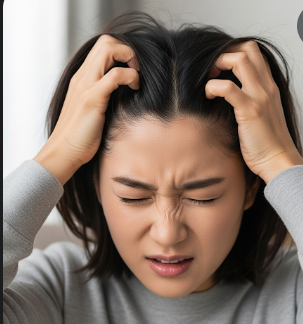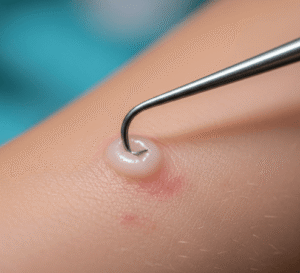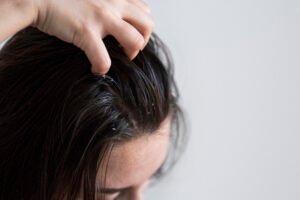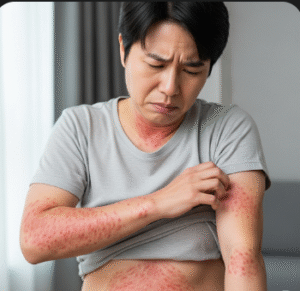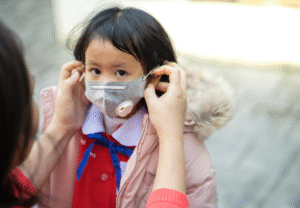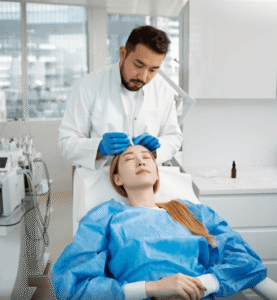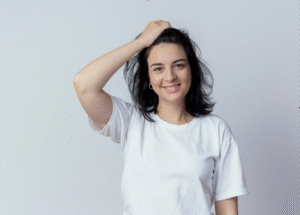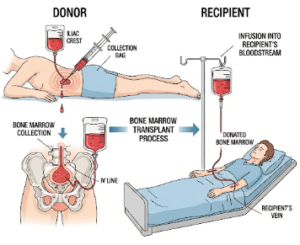Overview
An itchy scalp, medically referred to as scalp pruritus, is a common condition that can cause discomfort, irritation, and embarrassment. It may be mild and occasional or persistent and severe, impacting daily activities and quality of life.
In Korea, dermatology clinics offer comprehensive evaluation and treatment for itchy scalp, addressing underlying causes such as dandruff, fungal infections, allergic reactions, or skin conditions like psoriasis or eczema. Early diagnosis and proper treatment can relieve symptoms effectively and prevent complications such as secondary infections or hair loss.
Key Facts
- ➔ Itchy scalp affects people of all ages and can result from various dermatological and systemic causes.
- ➔ Common triggers include dry skin, dandruff, seborrheic dermatitis, fungal infections, and allergies.
- ➔ Persistent or severe itch may indicate an underlying medical condition.
- ➔ Scratching the scalp can lead to sores, bleeding, and secondary bacterial infections.
- ➔ Treatment is highly effective when tailored to the underlying cause.
What is Itchy Scalp?
An itchy scalp is a symptom rather than a disease. It occurs when nerve endings in the scalp are stimulated, causing the urge to scratch. The sensation may arise from:
- ➔ Dermatological causes: Conditions such as dandruff (seborrheic dermatitis), psoriasis, eczema, or fungal infections.
- ➔ Allergic reactions: Hair care products, shampoos, dyes, or topical medications.
- ➔ Environmental factors: Dry air, pollution, or extreme weather conditions.
- ➔ Systemic factors: Hormonal changes, stress, nutritional deficiencies, or certain medications.
Understanding the root cause is critical for effective treatment and preventing recurrence.
What Symptoms Are Related To
In addition to itchiness, an itchy scalp may be associated with:
- ➔ Redness, inflammation, or irritation of the scalp
- ➔ Flaking or dandruff-like scales
- ➔ Hair thinning or hair loss in severe or chronic cases
- ➔ Scabs, sores, or crusting due to scratching
- ➔ Burning or stinging sensations
- ➔ Sensitivity to hair products or environmental factors
Recognizing these symptoms helps distinguish between mild, self-limiting irritation and more serious scalp disorders.
What Causes / Possible Causes
Several factors can lead to an itchy scalp:
- ➔ Seborrheic dermatitis (dandruff): Overgrowth of yeast on the scalp causing flakes and itch.
- ➔ Psoriasis: Chronic autoimmune skin condition leading to thick, scaly plaques.
- ➔ Eczema (atopic dermatitis): Dry, itchy, inflamed skin that can affect the scalp.
- ➔ Fungal infections (tinea capitis): Ringworm of the scalp causing redness, scaling, and hair loss.
- ➔ Allergic reactions: Sensitivity to shampoos, conditioners, hair dyes, or other hair care products.
- ➔ Head lice: Infestation leading to intense itching and irritation.
- ➔ Environmental factors: Dry air, extreme temperatures, or frequent exposure to water or harsh chemicals.
- ➔ Systemic factors: Stress, hormonal imbalances, or nutritional deficiencies such as zinc or vitamin B12 deficiency.
Identifying the underlying cause is essential for targeted treatment and long-term relief.
When Should I See My Doctor
Consult a healthcare provider if:
- ➔ Itching is persistent, severe, or worsening despite home care
- ➔ You notice redness, swelling, pus, or crusting
- ➔ Hair loss occurs alongside itchiness
- ➔ Over-the-counter shampoos or treatments do not improve symptoms
- ➔ You suspect fungal infection, head lice, or allergic reaction
Early evaluation helps prevent complications such as infection, hair loss, or chronic scalp disorders.
Care and Treatment
Management of an itchy scalp depends on the cause, severity, and individual response:
- ➔ Medicated shampoos: Anti-dandruff shampoos containing ketoconazole, zinc pyrithione, or selenium sulfide for fungal or seborrheic causes.
- ➔ Topical treatments: Corticosteroid creams or lotions for inflammatory conditions like psoriasis or eczema.
- ➔ Allergen avoidance: Discontinuing products that trigger allergic reactions.
- ➔ Good scalp hygiene: Regular washing, gentle brushing, and avoiding harsh hair treatments.
- ➔ Moisturizing treatments: Oils or emollients for dry scalp conditions.
- ➔ Oral medications: Antifungal drugs or antibiotics if secondary infection occurs.
- ➔ Stress management and nutrition: Addressing lifestyle factors and deficiencies contributing to scalp health.
Most cases improve with targeted treatment and proper scalp care, though chronic conditions may require ongoing management.
Treatment Options in Korea
Korean dermatology clinics provide advanced and comprehensive care for itchy scalp:
- ➔ Clinical evaluation: Physical examination and scalp assessment by dermatologists.
- ➔ Diagnostic tests: Skin scrapings, cultures, or allergy testing to identify infection or allergic triggers.
- ➔ Topical and oral therapy: Prescription-strength shampoos, corticosteroids, antifungals, or antibiotics as needed.
- ➔ Specialized hair care programs: Combining scalp therapy, nutrition guidance, and lifestyle counseling.
- ➔ Follow-up and monitoring: Regular evaluation to track improvement and prevent recurrence.
- ➔ Holistic treatment: Addressing underlying stress, systemic health, and nutritional status to maintain scalp health.
Leading hospitals such as Seoul National University Hospital, Asan Medical Center, and Samsung Medical Center provide multidisciplinary care combining dermatology, trichology, and holistic health approaches.
In Summary: An itchy scalp is a common but manageable condition that can significantly affect comfort and confidence. Early diagnosis, targeted treatment, and proper scalp care in Korea can relieve symptoms, prevent complications, and promote healthy hair and skin.
- ➔ Key Takeaway: Persistent or severe scalp itchiness should be evaluated by a dermatologist to identify underlying causes.
- ➔ Action Point: Seek medical advice for a tailored treatment plan including medicated shampoos, topical therapies, and lifestyle guidance.

